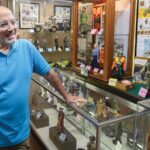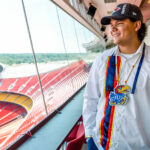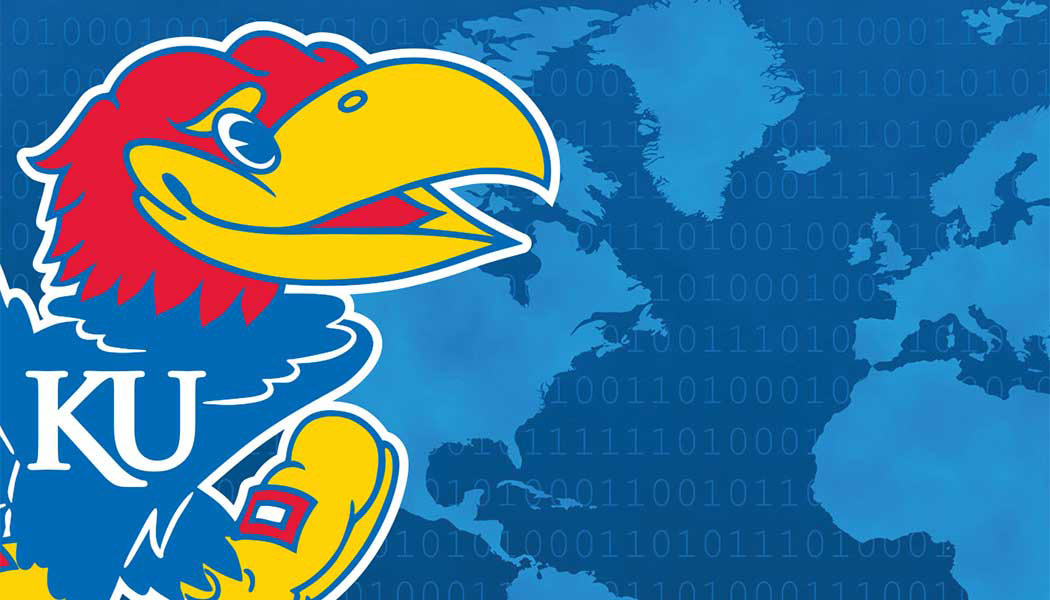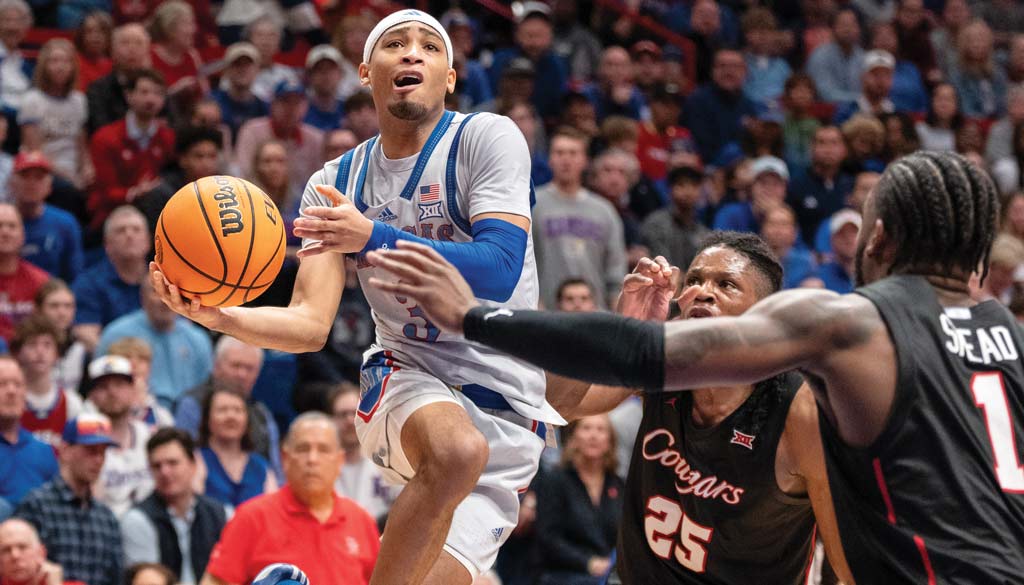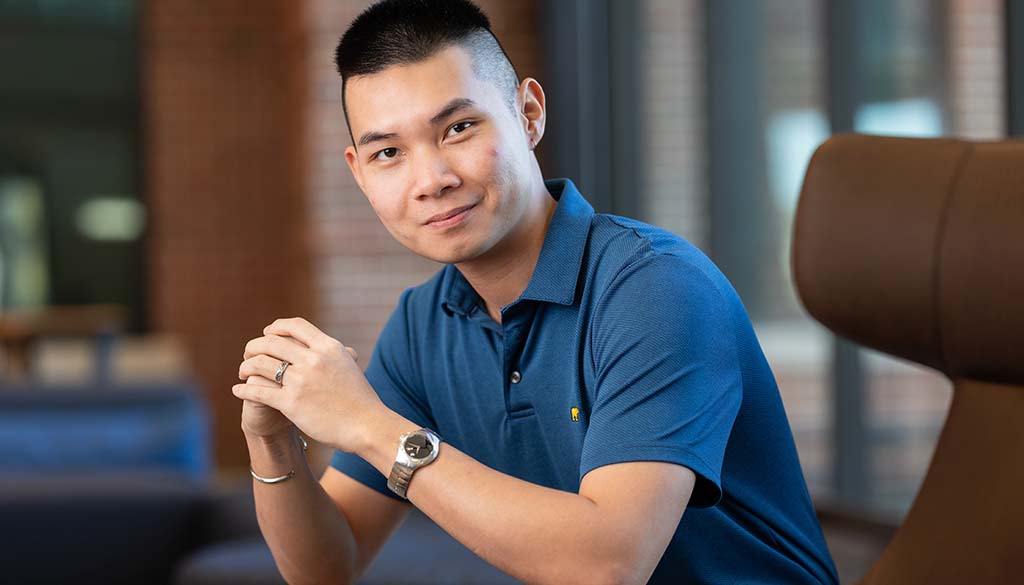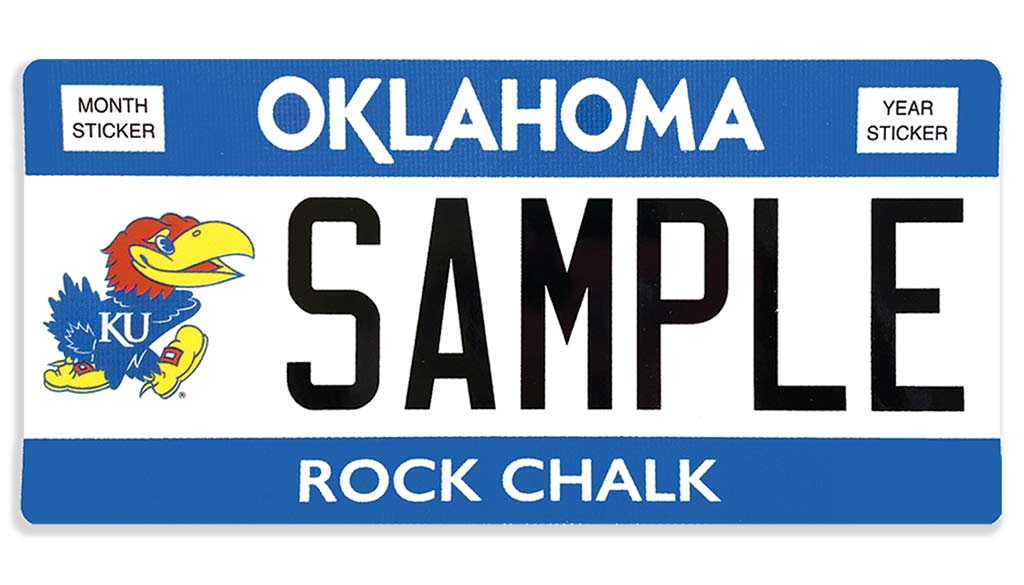B-52 pilot shares life story
Even before ever visiting Mount Oread, pilot's love for KU was so great he named his B-25 'Jayhawk'
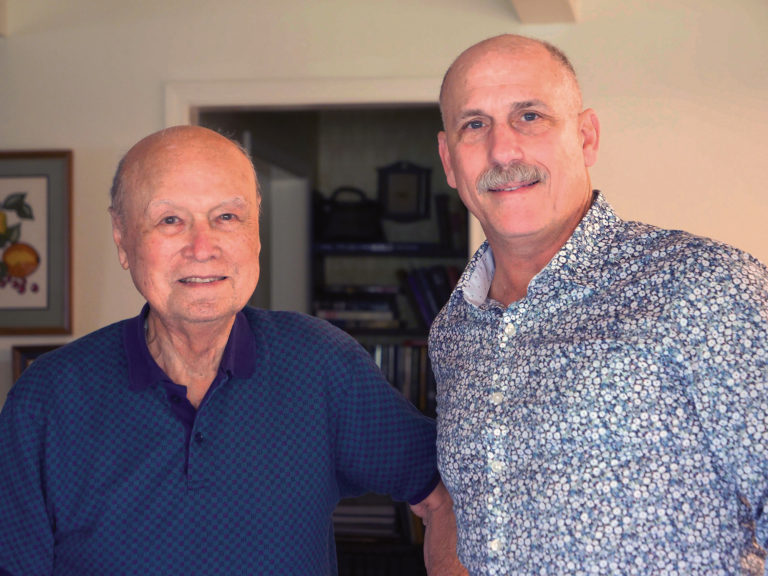
Lawrence Cooper, c’1907, spoke seven languages by the time he arrived in the Philippines, shortly after his KU graduation, to help create a U.S.-style education system in the former Spanish colony. As author Jay Stout notes in Jayhawk: Love, Loss, Liberation, and Terror Over the Pacific—a biography of Cooper’s son George, a World War II B-25 pilot—the elder Cooper “was not a naïve rube on an altruistic lark.”
The son of homesteaders and ranchers in Peabody, on the Flint Hills’ western fringe, Cooper had taught in a one-room school-house, worked as a reporter in Mexico’s turbulent prerevolutionary days and tramped around the globe aboard a steamship. He met and married a Filipina teacher from a well-to-do family and, after a decade as a teacher and administrator, rooted his family in the Philippines for good as an executive with the Goodyear tire company.
Their second son, George, left Manila in 1940, paying his passage to the United States by working as an apprentice seaman aboard a Danish freighter. As he reached the top of the gangplank and turned to wave goodbye, George saw his father striding toward him; he quickly checked his pockets, wondering what he’d forgotten.
What he’d forgotten, his father whispered in his ear, was to kiss his mother goodbye.
“I really think that taught me something,” Cooper, e’49, a centenarian and one of the few surviving World War II pilots who saw action over the Pacific, says from his longtime Tonganoxie home. “That’s my philosophy now, that it’s much better to be lovable and caring than anything else.”
Stout, himself a retired Marine Corps fighter pilot and combat veteran, contends—surprisingly, given how much drama he delivers—that Cooper’s wartime exploits perhaps don’t rate being preserved in a book.
“He’ll be first to tell you that his [combat experience] was fairly typical,” Stout, the author of 12 previous books related to air combat, says from his Charlottesville, Virginia, home.
What sets Cooper’s story apart, Stout says, was the All-American pilot’s idyllic boyhood in prewar Philippines and his family’s harrowing years of destruction and imprisonment as Japanese forces laid waste to their beloved homeland. It is a significant chapter of the World War II story that is too often overlooked, an unfortunate trend that Cooper is eager to help correct.
“You won’t find anybody who really knows much about the Philippines,” Cooper says, “yet it was an integral part of our fight for freedom.”
Stout and Cooper describe in detail the story of how Cooper chose to name his factory-fresh B-25 the Jayhawk. The bomber turned out to be a bit of a lemon at first, requiring constant repairs and white-knuckle piloting on its long journey from California to its eventual base of combat operations, Port Moresby, New Guinea. Yet Jayhawk proved itself in battle, delivering Cooper and his crew safely through the war, then doing the same for subsequent crews—all of which kept Cooper’s original moniker—until finally being retired as “war weary” after more than 120 missions.
Cooper explains that his grandmother spied Old North College while passing through Lawrence on the way to her sister’s homestead in what would become Peabody; she vowed in that moment that her children would return to the idyllic spot as college students. Cooper’s grandparents in 1902 moved the family from Peabody to Lawrence, where they bought 20 acres near the old Dutch mill on Ninth Street before opening a rooming house close to campus and downtown.
At home in the Philippines, Lawrence Cooper regaled the children with stories of KU and taught them the Rock Chalk Chant; when George boarded the freighter that day in 1940, he intended to find work and save money for his KU education. War intervened, but he made his way to Mount Oread as quickly as he could—by then with his own wife and child along for the adventure—and went on to a distinguished career in business, retiring in 1986 as vice president of medical gases for Puritan Bennett.
“Quite frankly,” Stout says, “I’ve never encountered someone so attached to a university, to have such a love for an institution, the way George does for KU.”
Cooper, a Life Member of the Alumni Association, also continued his military career with the U.S. Air Force Reserve, commanding the 935th Military Airlift Wing after his promotion to colonel and flying numerous troop and cargo transport missions into South Vietnam. He retired from the military in 1971, and in 2018 was named a distinguished alumnus of the School of Engineering’s mechanical engineering department.
“I’ve had some real experiences through life,” Cooper says. “I think I can say that I never had any adverse feelings about anybody, and certainly not enough to bother me. I think that’s the best way to go through life. Love thy neighbor.”
